成功的定义
成功的定义
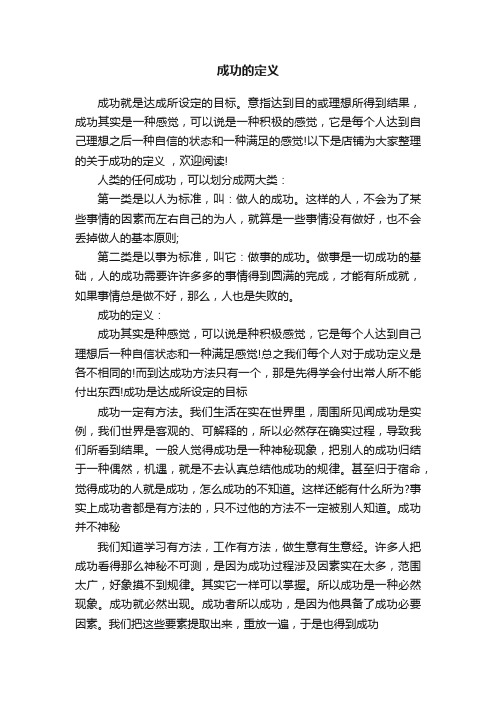
成功的定义成功就是达成所设定的目标。
意指达到目的或理想所得到结果,成功其实是一种感觉,可以说是一种积极的感觉,它是每个人达到自己理想之后一种自信的状态和一种满足的感觉!以下是店铺为大家整理的关于成功的定义,欢迎阅读!人类的任何成功,可以划分成两大类:第一类是以人为标准,叫:做人的成功。
这样的人,不会为了某些事情的因素而左右自己的为人,就算是一些事情没有做好,也不会丢掉做人的基本原则;第二类是以事为标准,叫它:做事的成功。
做事是一切成功的基础,人的成功需要许许多多的事情得到圆满的完成,才能有所成就,如果事情总是做不好,那么,人也是失败的。
成功的定义:成功其实是种感觉,可以说是种积极感觉,它是每个人达到自己理想后一种自信状态和一种满足感觉!总之我们每个人对于成功定义是各不相同的!而到达成功方法只有一个,那是先得学会付出常人所不能付出东西!成功是达成所设定的目标成功一定有方法。
我们生活在实在世界里,周围所见闻成功是实例,我们世界是客观的、可解释的,所以必然存在确实过程,导致我们所看到结果。
一般人觉得成功是一种神秘现象,把别人的成功归结于一种偶然,机遇,就是不去认真总结他成功的规律。
甚至归于宿命,觉得成功的人就是成功,怎么成功的不知道。
这样还能有什么所为?事实上成功者都是有方法的,只不过他的方法不一定被别人知道。
成功并不神秘我们知道学习有方法,工作有方法,做生意有生意经。
许多人把成功看得那么神秘不可测,是因为成功过程涉及因素实在太多,范围太广,好象摸不到规律。
其实它一样可以掌握。
所以成功是一种必然现象。
成功就必然出现。
成功者所以成功,是因为他具备了成功必要因素。
我们把这些要素提取出来,重放一遍,于是也得到成功复制成功是快速成功重要方式。
成功最快方法,是复制已经证明有效方法。
要快速成功,就一定要研究成功学,复制他人成功,远胜过自己摸索。
复制步骤首先确定你想要的结果。
然后找到已经有了这种结果人分析他策略,最后复制他做法。
你对成功的定义是什么?成功有什么步骤?
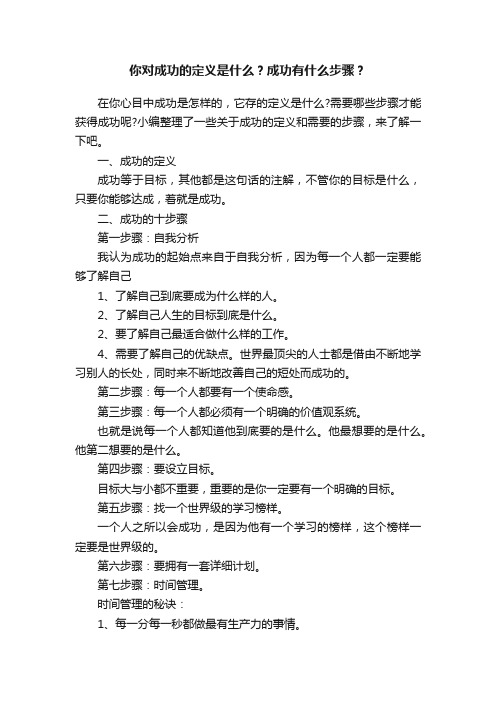
你对成功的定义是什么?成功有什么步骤?在你心目中成功是怎样的,它存的定义是什么?需要哪些步骤才能获得成功呢?小编整理了一些关于成功的定义和需要的步骤,来了解一下吧。
一、成功的定义成功等于目标,其他都是这句话的注解,不管你的目标是什么,只要你能够达成,着就是成功。
二、成功的十步骤第一步骤:自我分析我认为成功的起始点来自于自我分析,因为每一个人都一定要能够了解自己1、了解自己到底要成为什么样的人。
2、了解自己人生的目标到底是什么。
2、要了解自己最适合做什么样的工作。
4、需要了解自己的优缺点。
世界最顶尖的人士都是借由不断地学习别人的长处,同时来不断地改善自己的短处而成功的。
第二步骤:每一个人都要有一个使命感。
第三步骤:每一个人都必须有一个明确的价值观系统。
也就是说每一个人都知道他到底要的是什么。
他最想要的是什么。
他第二想要的是什么。
第四步骤:要设立目标。
目标大与小都不重要,重要的是你一定要有一个明确的目标。
第五步骤:找一个世界级的学习榜样。
一个人之所以会成功,是因为他有一个学习的榜样,这个榜样一定要是世界级的。
第六步骤:要拥有一套详细计划。
第七步骤:时间管理。
时间管理的秘诀:1、每一分每一秒都做最有生产力的事情。
2、有效地授权。
2、详细地计划。
第八步骤:建立组织。
成功者之所以会成功是因为有别人的帮忙,别人的支持,别人的肯定。
所以拥有良好的人脉是成功的基础。
第九步骤:要大量地阅读,不断地上课以及跟成功者交朋友。
第十步骤:大量地行动以及不断地付出。
所以假如你能依照这十个步骤来进行的话,成功一定是指日可待的。
通过学习如果对您有一点点帮助,请分享给您身边的朋友一起学习成长,每天坚持一点点,坚持带来大改变。
你对成功的定义是什么?成功有什么步骤?在你心目中成功是怎样的,它存的定义是什么?需要哪些步骤才能获得成功呢?小编整理了一些关于成功的定义和需要的步骤,来了解一下吧。
一、成功的定义成功等于目标,其他都是这句话的注解,不管你的目标是什么,只要你能够达成,着就是推荐度:点击下载文档文档为doc格式。
你如何定义“成功”?

你如何定义“成功”?
成功是每个人心中都有的一个概念。
有些人成功意味着财富和名望,而有些人则意味着家庭幸福和健康。
成功是无法用简单的定义来解释的,每个人的定义都不同。
那么,你如何定义“成功”?
1. 实现自己的目标
人生的成功是一个过程,而不是一个结局。
成功的定义取决于一个人的思想和目标。
要实现个人目标,您需要明确目标和规划。
有一个为实现目标所做的计划,这是成功的第一步。
2. 不断地学习和进步
成功的人都具有良好的学习能力。
他们知道如何从错误中吸取教训。
学习新知识和技能是个人成长和成功的一部分。
终身学习有助于我们更好地了解自己和世界。
3. 享受生活
成功需要耐心和毅力,但不要让他们成为个人进步的障碍。
仔细审慎地享受生活是非常重要的,因为它可以让您在成功的道路上保持积极的态度。
享受生活可以让我们更加平衡地处理工作和生活,使我们的生活更加丰富多彩。
无论您如何定义成功,不要忘记成功的过程比成功本身更重要。
在这
个过程中,您通过学习、追求目标和享受生活来塑造个人成长和成功。
在继续前进的道路上,不要忘记体验成功带来的每个瞬间。
成功的定义的五层基本含义

成功的定义的五层基本含义关于成功的定义你是否了解?关于成功的五层基本含义你又了解多少?以下是小编分享的aaaa,一起来和小编看看吧。
成功的定义的五层基本含义:1、预期的目标。
不同的人、不同的时期,有着不同的目标。
2、预期的目标一定是可以达成的,才算成功。
3、成功有明显的个性化特征,标准因人而异。
自己的标准、他人的标准、群体标准。
关键一,要有自己判别成功的标准;关键二,他人的标准与自己不同,要理解他人,理解社会。
4、成功是一个中性的概念。
好人与坏人都有成功。
5、成功是有数学概念的,所有的目标都是要具体量化的。
成功的四大要素:第一、目标。
你永远不可能强按着一头不想喝水的牛去喝水,同样,你也不可能在你自己不喜欢的领域,取得此生你所能取得的最大成就。
目标是欲望的表达,“要什么”从来就比“怎样做”更为重要。
但是目标不是欲望,目标更加具体,也往往给自己设定了时限。
它既有欲望的感情、牵动因素,同时也有自己做主、不让自己从散漫中游移的因素。
第二、胸怀。
所谓胸怀,就是一股用天下之材、尽天下之利的气度,当然,还包括相当程度的包容———对异己的包容,对陌生的包容,对不如自己者的包容。
只有这样,你才会形成一种从广大处觅人生的态度,把生命的境界做大,把事业做大。
第三、勇气。
冒险的勇气、行动的勇气。
人的自由在于人的主动性,人的主动性在于向多种可能性敞开。
假如你不尝试什么,你就不会真正知道自己是什么,也不会知道自己到底要什么。
所以有这样一句倒是很值得一记:举枪———射击———瞄准。
毋惮初难,毋恃久安,先做了再说。
一切生机全从行动中来,从动态发展中来。
人常常抱怨自己缺少机会,记住,运动乃机会之母。
第四、。
许多事没有成功,不是由于构想不好,也不是由于没有努力,而是由于努力不够。
时下有个概念叫开拓者。
什么叫开拓?开拓就是除了开辟还需拓进。
坚持就是拓进,就是遇到困难决不放弃的韧劲儿。
就这样,目标、胸怀、勇气、坚持,再加上聪明,构成了成功者最为重要的五要素,而聪明只占第五位。
什么是成功?

什么是成功?成功,是每个人都向往的终极目标。
但是,成功的真正含义是什么?下面,我们来探究一下。
一、成功的定义成功是一种状态,当一个人达到他所期望的目标时,我们常常称之为成功。
不同的人对成功的定义不尽相同,有的人认为财富是成功,有的人认为家庭是成功,还有人认为成功就是完成一件事情。
因此,一份成功的定义需要综合各种因素,包括物质、精神等多个方面。
二、成功的要素成功的要素有许多,以下是最重要的几个要素:1.目标明确:一个人要成功,首先需要选择一个明确的目标。
这个目标需要符合自己的兴趣、能力和梦想。
同时,目标也需要具有可行性和实现性。
2.坚定的决心:没有坚定的决心,一个人可能会在路途中放弃。
一个人要想获得成功,就必须克服困难和挫折,在面对挑战时保持冷静、淡定。
3.不断的学习:成功并不是一蹴而就的,需要长期的积累和学习。
一个人如果想获得成功,就必须保持学习的状态,不断地提高自己的能力和技能,不断地探索创新。
4.追求卓越:一个人想要成功,就必须追求卓越。
这意味着要在工作、学习和生活中追求更加优秀的表现和成果,不断超越自己、挑战极限。
三、成功的标志成功并不是一种简单的结果,而是一种过程。
那么,我们怎样来判断一个人是否成功呢?1.持续的成长:一个成功的人应该要一直成长并追求更高的目标。
他们应该具备不断学习、积累和提高的功夫。
2.对社会的贡献:成功并不只是对个人的财富的追求,而是为社会做出的贡献。
一个人如果能为社会作出贡献,就说明他是成功的。
3.享受生活:成功的人往往能够充分地享受生活,他们明白成功的意义不仅在于创造财富,更在于成就自己。
4.积极的态度:一个成功的人应该具备积极的态度和高度的自信心。
只有这样,他们才能在困难和挑战面前保持镇静和信心。
总之,成功的定义和标准因人而异,但无论是谁,都需要坚定的决心、追求卓越的精神和持续的努力才能走向成功之路。
成功的新华字典解释
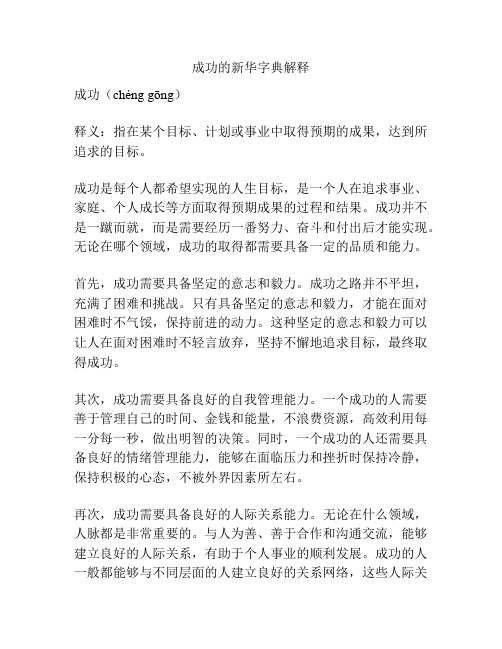
成功的新华字典解释成功(chéng gōng)释义:指在某个目标、计划或事业中取得预期的成果,达到所追求的目标。
成功是每个人都希望实现的人生目标,是一个人在追求事业、家庭、个人成长等方面取得预期成果的过程和结果。
成功并不是一蹴而就,而是需要经历一番努力、奋斗和付出后才能实现。
无论在哪个领域,成功的取得都需要具备一定的品质和能力。
首先,成功需要具备坚定的意志和毅力。
成功之路并不平坦,充满了困难和挑战。
只有具备坚定的意志和毅力,才能在面对困难时不气馁,保持前进的动力。
这种坚定的意志和毅力可以让人在面对困难时不轻言放弃,坚持不懈地追求目标,最终取得成功。
其次,成功需要具备良好的自我管理能力。
一个成功的人需要善于管理自己的时间、金钱和能量,不浪费资源,高效利用每一分每一秒,做出明智的决策。
同时,一个成功的人还需要具备良好的情绪管理能力,能够在面临压力和挫折时保持冷静,保持积极的心态,不被外界因素所左右。
再次,成功需要具备良好的人际关系能力。
无论在什么领域,人脉都是非常重要的。
与人为善、善于合作和沟通交流,能够建立良好的人际关系,有助于个人事业的顺利发展。
成功的人一般都能够与不同层面的人建立良好的关系网络,这些人际关系网络会为个人的事业发展提供支持和帮助。
总之,成功是一个人在追求事业、家庭、个人成长等方面取得的预期成果。
成功的取得需要具备坚定的意志和毅力、良好的自我管理能力以及良好的人际关系能力。
当然,每个人对成功的定义都不尽相同,只要有自己的目标并为之努力奋斗,不断完善自己,就有可能取得自己心目中的成功。
成功不仅仅是一种结果,更是一种内心的满足和成就感。
成功也是每个人不断奋斗的过程。
成功不是一成不变的,它是不断成长和进步的结果。
成功的过程中充满了挑战和机遇,只有不断适应环境和学习新知识,才能不断提升自己,取得更大的成功。
成功的路径充满了坎坷和挫折,但每一次的挫折都是激励人们更加努力的契机。
成功的人往往具备积极向上的心态,能够从失败和挫折中汲取教训,并不断调整自己的策略和方法。
什么是成功?

什么是成功?当谈到成功时,它可以被定义为实现目标、达到预期结果或成就所追求的目标。
成功是一个主观的概念,因为每个人对成功的定义可能会有所不同。
然而,无论个人对成功的定义如何,成功通常涉及以下几个方面:1. 目标实现:成功通常与目标的实现相关。
无论是个人目标,如学业、事业、财务或家庭目标,还是组织目标,如销售增长、市场份额扩大或创新突破,成功意味着达到或超越预期的结果。
2. 持续努力:成功往往需要持续的努力和奋斗。
成功的道路往往不是一帆风顺的,它需要坚持、毅力和恒心。
成功往往是通过克服挑战、学习经验教训并不断改进的过程。
3. 幸福感和满足感:成功通常与个人的幸福感和满足感相关。
成功不仅仅是物质上的成就,也包括个人的内心满足感和快乐感。
成功可能涉及实现个人激情和兴趣,与他人建立良好关系,以及在自己认为重要的领域取得成就。
4. 自我成长和个人发展:成功与个人的成长和发展密切相关。
成功往往意味着不断学习、提升技能和知识,并在个人和职业生涯中不断进步。
成功是一个持续的过程,它鼓励个人不断超越自我,追求更高的目标和成就。
5. 影响力和贡献:成功也与个人的影响力和贡献相关。
成功的人往往能够对他人产生积极的影响,并为社会和他人做出贡献。
他们通过分享知识、提供帮助和支持他人的成功来扩大自己的影响力。
总结起来,成功是实现个人或组织目标的过程,它涉及目标实现、持续努力、幸福感和满足感、自我成长和个人发展,以及影响力和贡献。
成功是一个主观的概念,因为每个人对成功的定义和追求有所不同。
成功需要思考和规划,以及不断学习和改进,它是一个个人和职业生涯中的持续过程。
成功的定义

成功的定义
成功的定义是指能够达成预期目标的过程和结果。
成功的含义因人而异,每个人都有自己的标准,并且成功也有明显的个性化特征和数学概念。
金钱并不是衡量成功的唯一标准,成功还应该包括个人成长、人际关系、社会贡献等更为广泛的层面。
在现代社会,人们普遍认为成功就是赚到足够的钱,但这并不完全正确。
成功是一个多维度的概念,需要在健康、家庭、友情和精神满足感等领域取得平衡和满足。
因此,成功并不是一蹴而就的,而是一个需要坚持不懈和不断学习的漫长过程。
实现成功需要明确目标和计划,并具备正确的态度和心理素质,同时也需要不断学习和提高自己的能力和技能。
成功的追求可能会带来一些负面影响,如过度工作、压力和焦虑等,因此需要寻求平衡和协调。
成功也有好人和坏人的区别,取决于他们是否达成了预期的目标。
成功的人通常具备创新能力、领导力、自我管理和组织能力等特质,还需要对社会和环境做出贡献。
综上所述,成功的定义因人而异,关键在于对自我满足的认知。
了解自己的价值观,通过有意识、成体系的心理训
练,培养成功者所具备的心理状态,让自己的生活和工作更有价值。
成功的理解

成功的理解成功的理解成功是每个人都向往的,但对于不同的人,成功的定义也不尽相同。
有些人认为成功就是拥有大量财富,有些人则认为成功就是实现自己的梦想和目标。
无论如何,对于每个人来说,成功都是需要通过努力和付出才能实现的。
本文将从多个角度探讨成功的理解。
一、成功的概念1.1 成功定义成功是指一个人在某件事情上达到自己预期目标或者超越他人所期望的结果。
这个结果可以是物质上或精神上的收获。
对于不同的人来说,他们追求的成功也不尽相同。
1.2 成功与幸福虽然很多人认为财富和地位可以带来幸福,但事实上,幸福并不能完全依靠这些因素。
真正带来幸福的东西是内心感受到满足和快乐。
因此,我们应该在追求成功时也要注重内心感受。
二、如何实现成功?2.1 目标设定要想取得成功,首先需要设定明确、具体、可行、有挑战性且可衡量的目标。
这样才能知道自己要努力的方向和目标。
2.2 计划制定设定好目标后,需要制定详细的计划,确定实现目标的步骤和时间表。
在制定计划时,需要考虑到各种可能出现的情况,并预先做好应对措施。
2.3 坚持不懈成功需要长期坚持不懈地努力。
在面临困难和挫折时,需要保持积极乐观的心态,坚持前进。
同时,要善于总结经验教训,在失败中寻找成功的经验。
三、成功的要素3.1 自信心自信心是取得成功的重要因素之一。
只有相信自己能够成功,才能够付诸行动并克服困难。
3.2 毅力和耐力毅力和耐力也是取得成功必备的品质。
只有在面对挫折和困难时保持毅力和耐心,才能够坚持不懈地追求自己的目标。
3.3 具备专业知识和技能具备专业知识和技能是取得成功所必需的条件之一。
只有具备足够的知识和技能才能够胜任工作,实现自己的目标。
四、成功的实例4.1 乔布斯乔布斯是苹果公司的创始人之一,他的成功故事被广泛传颂。
他在创办苹果公司时并没有太多资金和资源,但凭借着自己的才华和毅力,最终将苹果公司打造成了全球知名品牌。
4.2 马化腾马化腾是中国互联网领域的重要人物之一,他创立了腾讯公司。
你认为成功的定义是什么?
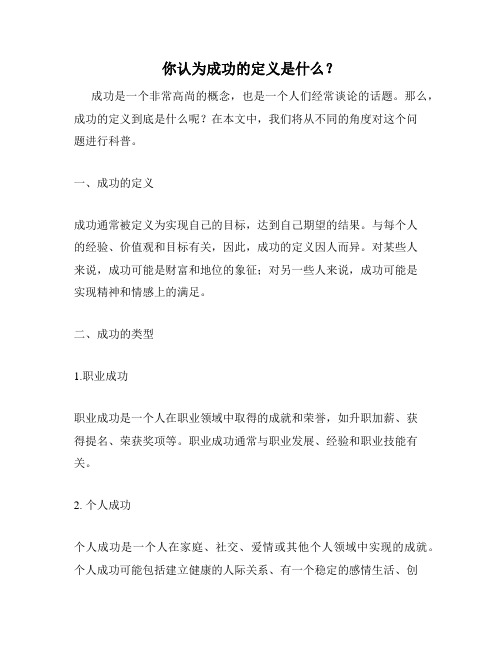
你认为成功的定义是什么?成功是一个非常高尚的概念,也是一个人们经常谈论的话题。
那么,成功的定义到底是什么呢?在本文中,我们将从不同的角度对这个问题进行科普。
一、成功的定义成功通常被定义为实现自己的目标,达到自己期望的结果。
与每个人的经验、价值观和目标有关,因此,成功的定义因人而异。
对某些人来说,成功可能是财富和地位的象征;对另一些人来说,成功可能是实现精神和情感上的满足。
二、成功的类型1.职业成功职业成功是一个人在职业领域中取得的成就和荣誉,如升职加薪、获得提名、荣获奖项等。
职业成功通常与职业发展、经验和职业技能有关。
2. 个人成功个人成功是一个人在家庭、社交、爱情或其他个人领域中实现的成就。
个人成功可能包括建立健康的人际关系、有一个稳定的感情生活、创造其他个人满足。
3. 财务成功财务成功是一个人在金融领域取得的成就,指的是财务稳定、消费习惯、商业投资、储蓄和投资。
财务成功与职业成功和创业有关。
4. 教育成功教育成功是指一个人在教育领域中所取得的成就,例如成绩优异、完成学业、获得学位和证书等。
教育成功是教育、学习和训练的结果。
5. 心理成功心理成功是指一个人在认知和情感层面的实现,例如实现内心平衡、理解自我、直面自我负面情绪和超越自然恐惧。
心理成功与心理健康、情感专业和人格发展有关。
三、成功的影响成功可以产生许多积极的影响,例如增强个人自信、提升个人形象、改善社会声誉。
成功还可以提高个人幸福感和生活质量,并为社会发展、创新和文化传承做出贡献。
四、如何实现成功1. 设定明确的目标:确定自己想要的目标和计划,并制定一个可行的时间表。
2. 采用行动和决心:不仅只是理论和计划,还需要采取具体的行动实现目标,并且需要持续保持决心和毅力。
3. 学会从失败中学习:与成功相对应的,也是失败。
但是应该看到,失败是一个人发展和成长的机会。
4. 寻求有益的资源:成功需要有好的资源和关系,例如优秀的导师、合作伙伴、朋友和家人。
成功的定义——精选推荐
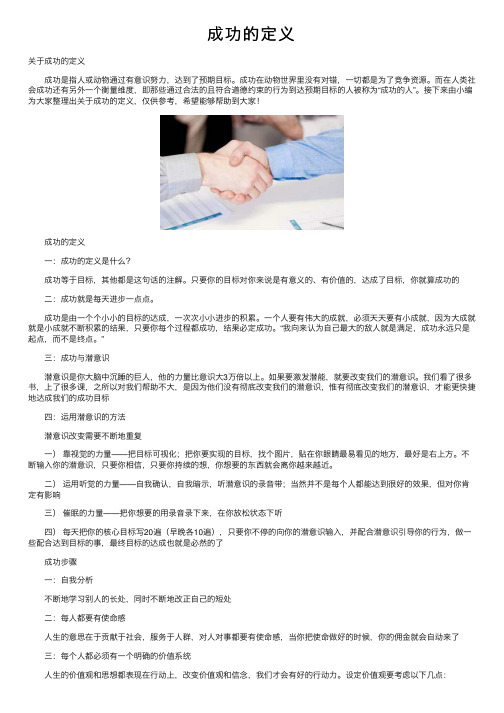
成功的定义关于成功的定义 成功是指⼈或动物通过有意识努⼒,达到了预期⽬标。
成功在动物世界⾥没有对错,⼀切都是为了竞争资源。
⽽在⼈类社会成功还有另外⼀个衡量维度,即那些通过合法的且符合道德约束的⾏为到达预期⽬标的⼈被称为“成功的⼈”。
接下来由⼩编为⼤家整理出关于成功的定义,仅供参考,希望能够帮助到⼤家! 成功的定义 ⼀:成功的定义是什么? 成功等于⽬标,其他都是这句话的注解。
只要你的⽬标对你来说是有意义的、有价值的,达成了⽬标,你就算成功的 ⼆:成功就是每天进步⼀点点。
成功是由⼀个个⼩⼩的⽬标的达成,⼀次次⼩⼩进步的积累。
⼀个⼈要有伟⼤的成就,必须天天要有⼩成就,因为⼤成就就是⼩成就不断积累的结果,只要你每个过程都成功,结果必定成功。
“我向来认为⾃⼰最⼤的敌⼈就是满⾜,成功永远只是起点,⽽不是终点。
” 三:成功与潜意识 潜意识是你⼤脑中沉睡的巨⼈,他的⼒量⽐意识⼤3万倍以上。
如果要激发潜能,就要改变我们的潜意识。
我们看了很多书,上了很多课,之所以对我们帮助不⼤,是因为他们没有彻底改变我们的潜意识,惟有彻底改变我们的潜意识,才能更快捷地达成我们的成功⽬标 四:运⽤潜意识的⽅法 潜意识改变需要不断地重复 ⼀)靠视觉的⼒量——把⽬标可视化;把你要实现的⽬标,找个图⽚,贴在你眼睛最易看见的地⽅,最好是右上⽅。
不断输⼊你的潜意识,只要你相信,只要你持续的想,你想要的东西就会离你越来越近。
⼆)运⽤听觉的⼒量——⾃我确认,⾃我暗⽰,听潜意识的录⾳带;当然并不是每个⼈都能达到很好的效果,但对你肯定有影响 三)催眠的⼒量——把你想要的⽤录⾳录下来,在你放松状态下听 四)每天把你的核⼼⽬标写20遍(早晚各10遍),只要你不停的向你的潜意识输⼊,并配合潜意识引导你的⾏为,做⼀些配合达到⽬标的事,最终⽬标的达成也就是必然的了 成功步骤 ⼀:⾃我分析 不断地学习别⼈的长处,同时不断地改正⾃⼰的短处 ⼆:每⼈都要有使命感 ⼈⽣的意思在于贡献于社会,服务于⼈群,对⼈对事都要有使命感,当你把使命做好的时候,你的佣⾦就会⾃动来了 三:每个⼈都必须有⼀个明确的价值系统 ⼈⽣的价值观和思想都表现在⾏动上,改变价值观和信念,我们才会有好的⾏动⼒。
你认为成功的定义是什么?

你认为成功的定义是什么?
成功的定义因人而异,因为每个人对成功的理解都有所不同。
然而,一般来说,成功可以被定义为实现个人目标和追求的状态。
成功不
仅仅是指在事业上取得成就,也可以包括在人际关系、健康、财务
和个人成长等方面取得进步。
成功的定义还可以包括以下几个方面:
1. 实现个人目标:成功意味着能够实现自己设定的目标,无论是在
事业上、家庭生活中还是个人成长方面。
这些目标可以是短期的,
也可以是长期的,但成功意味着能够朝着这些目标不断努力并最终
实现。
2. 追求幸福:成功也可以被定义为追求幸福和满足感的状态。
这包
括对自己的生活和工作感到满意,以及在人际关系中获得支持和爱。
3. 克服困难:成功还可以意味着能够克服困难和挑战,不断成长和
进步。
这种成功是通过战胜挫折和失败,不断学习和改进自己来实
现的。
4. 对社会的贡献:成功也可以包括对社会做出积极贡献,帮助他人
并影响周围的人。
这种成功是通过影响力和领导力来实现的。
总的来说,成功是一个综合性的概念,涵盖了个人目标的实现、幸福感的追求、克服困难的能力和对社会的贡献。
每个人对成功的定义都会有所不同,但成功的核心是努力实现自己的目标并在这个过程中取得满足感和成就感。
关于成功的定义
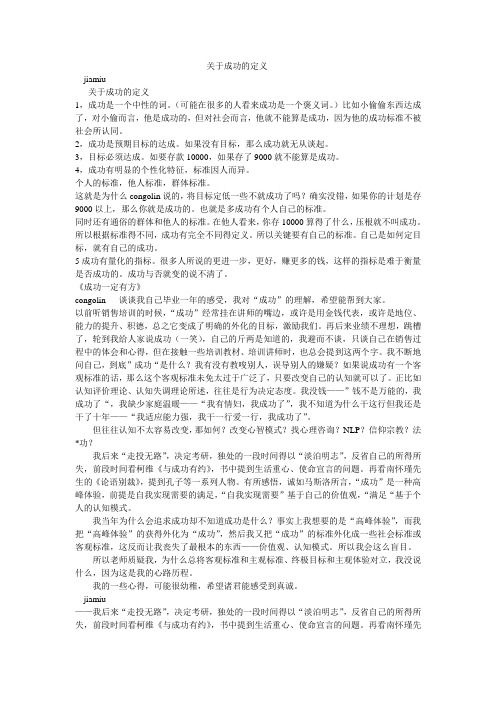
关于成功的定义jiamiu关于成功的定义1,成功是一个中性的词。
(可能在很多的人看来成功是一个褒义词。
)比如小偷偷东西达成了,对小偷而言,他是成功的,但对社会而言,他就不能算是成功,因为他的成功标准不被社会所认同。
2,成功是预期目标的达成。
如果没有目标,那么成功就无从谈起。
3,目标必须达成。
如要存款10000,如果存了9000就不能算是成功。
4,成功有明显的个性化特征,标准因人而异。
个人的标准,他人标准,群体标准。
这就是为什么congolin说的,将目标定低一些不就成功了吗?确实没错,如果你的计划是存9000以上,那么你就是成功的。
也就是多成功有个人自己的标准。
同时还有通俗的群体和他人的标准。
在他人看来,你存10000算得了什么,压根就不叫成功。
所以根据标准得不同,成功有完全不同得定义。
所以关键要有自己的标准。
自己是如何定目标,就有自己的成功。
5成功有量化的指标。
很多人所说的更进一步,更好,赚更多的钱,这样的指标是难于衡量是否成功的。
成功与否就变的说不清了。
《成功一定有方》congolin 谈谈我自己毕业一年的感受,我对“成功”的理解,希望能帮到大家。
以前听销售培训的时候,“成功”经常挂在讲师的嘴边,或许是用金钱代表,或许是地位、能力的提升、积德,总之它变成了明确的外化的目标,激励我们。
再后来业绩不理想,跳槽了,轮到我给人家说成功(一笑),自己的斤两是知道的,我避而不谈,只谈自己在销售过程中的体会和心得,但在接触一些培训教材、培训讲师时,也总会提到这两个字。
我不断地问自己,到底”成功“是什么?我有没有教唆别人,误导别人的嫌疑?如果说成功有一个客观标准的话,那么这个客观标准未免太过于广泛了,只要改变自己的认知就可以了。
正比如认知评价理论、认知失调理论所述,往往是行为决定态度。
我没钱——”钱不是万能的,我成功了“,我缺少家庭温暖——“我有情妇,我成功了”,我不知道为什么干这行但我还是干了十年——“我适应能力强,我干一行爱一行,我成功了”。
什么是成功?

什么是成功?成功是人类永恒追求的目标,但它却很难被精确地定义。
究竟什么是成功?成功的含义和标准又是什么?今天,我们就来为你揭开成功的奥秘,让你领悟到什么才是真正的成功。
一、成功的含义成功是指在完成自己的目标或者任务后,获得了肯定和回报的状态。
通俗来说,成功就是困难之后,通过一定的努力和技巧,最终达到预设目标的事情。
二、成功的标准1.满足自我要求成功的最高标准是满足自我要求。
每个人的自我要求不同,在作出努力之后,给自己定下一个实现这个目标的标准,成功的感觉才能更加的强烈。
2.实现信仰与目标不同人有不同的信仰和追求,成功也不尽相同。
成功的标准之一是实现自己的信仰和目标。
3.社会行为的影响成功不仅是一个人的内心体验,还对社会行为产生影响。
所以,在不同的场合和背景下,比如商业领域、创业投资等等,成功的标准就有了相应调整。
三、成功的秘诀1.做好规划成功的秘诀之一是做好规划。
制定目标、明确步骤、制定时间表、制定计划、及时调整,规划使实现目标更加有序。
2.勇于拼搏成功与勇气密不可分。
如果只是空想而不付出行动,便无法实现成功。
因此,勇气变成了个人成功的基石。
只有敢于迎接挑战,克服困难,才能赢得成功。
3.学会调整策略成功路上充满荆棘和波折。
一个人一旦遇到困难,就不能因为失败而丧失信心。
成功者都能够调整策略或者改变原来的做法,从而找到一个新的、更好的方法来解决问题。
4.坚守信念和信仰每个人都需要有自己的信仰和追求,这是成功的基础。
坚定自己的信念和信仰会让你在追求成功的道路上更加坚定。
5.不畏虚伪不论是成功与否,我们都需要处事诚实而公正。
成功者不会因为追求成功而放弃自己的道德准则;他们知道,对于任何问题,我们应该付出诚实、公正的态度和行动。
总之,成功的内涵和标准是多样的,成功的路上需要学会勇气和坚持,社会行为的影响也会对成功的标准产生影响。
只有在正道上努力追求,并且坚定自己的信仰和信念,才能用自己的实际行动去证明,真正的成功是不言而喻的。
你如何定义“成功”?

你如何定义“成功”?
成功,对于每个人而言,都具有不同的含义。
有人认为,获得财富、
地位和名声就是成功;也有人认为,追求内心的幸福感和平静才是真
正的成功。
那么,究竟什么是成功呢?接下来,我们将从不同角度给大家分享一
些看法。
一、以物质标准来衡量成功
在当今社会,很多人都认为成功就是拥有足够的物质财富。
他们认为,拥有高薪、豪车、豪宅和足够的储蓄就可以认为是成功的人。
然而,物质财富并不能完全代表成功。
如果我们一味地追求物质上的
满足,却丧失了内心的平静和快乐,那么这样的“成功”反而是失败。
二、以职业发展来衡量成功
职业成功也是一种成功。
一些人认为只有担任高管职位、拥有创业公
司才被称为是成功的人。
但其实我们需要知道,职业成功并非唯一的成功标准,而是一个人成
就的一个方面。
在追求职场成功的同时,我们也要注重个人成长,个
人情感状态也很重要。
三、以人际关系来衡量成功
友情、亲情、爱情等人际关系也是一种成功,能与身边重要的人建立起良好的关系,有人帮助、相互支持,这是一份成功,因为在人生旅程中,主动去与别人交流相互关系不仅能增加你的社交圈子和对某些事情的了解,还可以从别人身上学到很多。
在这里我们可以看出,直接以物质或者外表成功是有局限性的,而对于成功的定义,应该更多从个人的角度来看,内心的追求,生活中的成长和发展。
我们如何定义“成功”?

我们如何定义“成功”?作为人类长期以来的关注点,成功在不同人的眼中有着不同的定义和理解。
究竟什么是成功?我们该如何定义它呢?以下是一些关于“成功”的定义和看法,或许可以帮助我们更好地认识成功。
一、传统观点:成功就是“有钱”在传统观念中,成功往往被定义为拥有一定的财富和物质财富,也就是“富裕”、“有钱”。
许多人认为,只有有了钱才能过上幸福的生活,并且钱是衡量一个人能力和贡献的重要标准之一。
然而,这种观念也随着时代的变迁而发生了变化,越来越多地人开始意识到,成功不仅仅是金钱。
二、新时代的“成功”观念:多元化随着人们思想观念的不断更新和社会的发展,现在的“成功”观念已经越来越多元化。
除了经济上的成功,还包括很多方面,比如在自我实现、家庭生活、社会奉献等方面取得的“成功”。
新时代中,我们不再局限于传统的量化标准,更多地关注个人精神层面的发展。
因此,在当今社会,“成功”往往是指一个人对生活中的各种侧面都有非常明确的理解和开拓一种具有意义的方式。
三、成功的内在表现成功不仅仅是外在的物质成就,也并非所有人都适合追求物质上的成功。
有许多人可以通过探索自我、发现自己的潜能并实现自我发展来获得自我满足和内心的成功。
在这个时代,拥有一个稳定的工作,财务资产等都不再是唯一的标准,还要关注自己的内在需求,比如对于艺术、文学、音乐、旅行等等,使我们成为更加优秀喜欢自己、获得更高价值的人们。
四、实现自我价值的成功成功不仅仅是取得社会上的认可和肯定,还包括实现自己价值的完成感。
如果我们能够将自己的价值观,通过工作、创业、宗教、支持弱者等各种方面的体现,那这是一种有意义的成功,它有利于激发你生命的激情和支持你的决心。
五、总结不要把“成功”定义得太狭隘,许多人只关注一个方面而忽视其他侧面,这针对不同人群和不同生活阶段的引导不一样。
可能现在在追求“成功”时,我们需要扩大我们的视野,了解我们内心的需求和找到适合我们的方式去实现一种有意义的生活方式,从而体验到最高效的“成功”经验!。
所谓的成功的定义是什么?

所谓的成功的定义是什么?一、不同人对成功的定义不同人对成功的定义各有不同。
对于某些人来说,成功意味着在事业上获得卓越成就;对于另一些人来说,成功可能代表着在家庭和社交关系中的和谐与满足。
然而,不论是哪种定义,都透露出一个追求自我完善和满足感的共同之处。
1. 在事业上获得卓越成就对于部分人而言,成功意味着在事业上获得卓越成就。
他们追求在工作中脱颖而出、成为行业的佼佼者。
这些人意志坚定,努力工作,不断提升自己的技能和知识。
他们善于规划和执行,勤奋不懈地追逐自己设定的目标。
2. 在家庭和社交关系中的和谐与满足另一部分人认为,成功意味着在家庭和社交关系中获得和谐与满足。
他们关注人际关系的建立和维护,注重家庭的温暖和和睦。
这些人懂得用爱和关怀去维系亲情和友情,注重沟通和理解,使得自己在家庭和社交圈中受人尊重和喜爱。
二、成功的本质特征无论是在事业还是家庭方面,成功都有一些本质特征。
成功不仅仅是简单的功利观念,更是一种内心追求和价值观的体现。
1. 追求卓越成功之路上,追求卓越是重要的特征之一。
这意味着个体不仅仅要追求普通的平均水平,更要持续不断地挑战自己,在不同领域中有所突破。
追求卓越的人会不断学习和进步,持续提高自己的能力和专业知识。
2. 克服困难成功的过程充满了困难和挑战。
在面对各种困境时,成功的人会保持坚韧不拔的品质,勇往直前,积极寻找解决问题的方法。
他们不抛弃、不放弃,甚至在逆境中获得更多的成长和机遇。
3. 善于创新成功的人具备一种善于创新的思维品质。
他们能够敏锐地洞察市场需求和潮流趋势,善于发现机会,并迎接变革。
创新使得他们能够在竞争中脱颖而出,成为引领潮流的人。
三、量化与非量化的成功成功的衡量标准可以分为量化和非量化两个方面。
量化的成功主要通过金钱、地位、权力等可见指标来衡量,非量化的成功则主要强调个人成长、幸福感、对他人的贡献等不易测量的因素。
1. 量化的成功量化的成功往往是外界看到的成功,它可以通过金钱、地位、权力等来具体展现。
成功的定义是什么
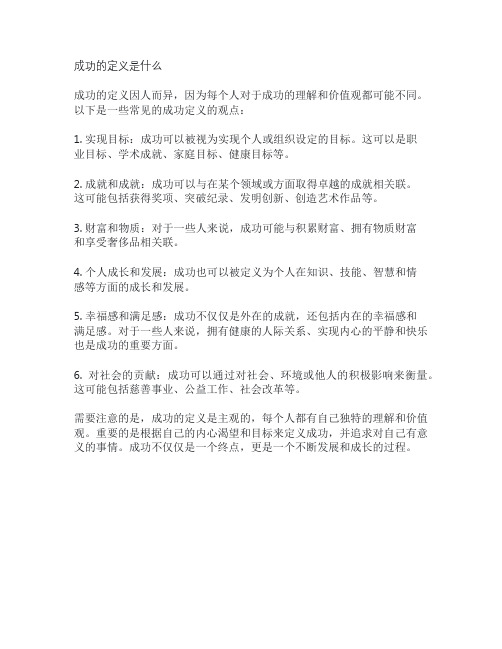
成功的定义是什么
成功的定义因人而异,因为每个人对于成功的理解和价值观都可能不同。
以下是一些常见的成功定义的观点:
1. 实现目标:成功可以被视为实现个人或组织设定的目标。
这可以是职
业目标、学术成就、家庭目标、健康目标等。
2. 成就和成就:成功可以与在某个领域或方面取得卓越的成就相关联。
这可能包括获得奖项、突破纪录、发明创新、创造艺术作品等。
3. 财富和物质:对于一些人来说,成功可能与积累财富、拥有物质财富
和享受奢侈品相关联。
4. 个人成长和发展:成功也可以被定义为个人在知识、技能、智慧和情
感等方面的成长和发展。
5. 幸福感和满足感:成功不仅仅是外在的成就,还包括内在的幸福感和
满足感。
对于一些人来说,拥有健康的人际关系、实现内心的平静和快乐也是成功的重要方面。
6. 对社会的贡献:成功可以通过对社会、环境或他人的积极影响来衡量。
这可能包括慈善事业、公益工作、社会改革等。
需要注意的是,成功的定义是主观的,每个人都有自己独特的理解和价值观。
重要的是根据自己的内心渴望和目标来定义成功,并追求对自己有意义的事情。
成功不仅仅是一个终点,更是一个不断发展和成长的过程。
对于成功的理解和定义

对于成功的理解和定义成功是每个人都向往的事情,它是人类社会发展的动力之一。
然而,成功的定义因人而异,因此,我们需要探讨成功的本质,以便更好地理解和定义成功。
一、成功是什么?成功是指达到预期目标的过程和结果。
这个目标可以是个人、团体或组织的,可以是物质的、精神的或者是其他方面的。
成功的实现需要付出努力、承担风险和面对挑战,因此,成功也是一种经验和学习过程。
二、成功的本质成功的本质是多方面的,它涉及到个人的内在品质、外在条件、社会环境等因素。
下面我们来分别探讨一下。
1. 内在品质成功的本质之一是个人的内在品质。
这些品质包括坚韧不拔、自信、创新、自律、耐心、毅力、勇气、责任感等。
这些品质可以帮助个人面对挑战、克服困难、抓住机遇,从而达到成功的目标。
2. 外在条件成功的本质之二是个人的外在条件。
这些条件包括家庭背景、教育背景、职业背景、人际关系等。
这些条件可以影响个人的思维方式、行为模式、人际交往能力等,从而影响个人的成功与否。
3. 社会环境成功的本质之三是社会环境。
这个环境包括文化背景、经济发展、政治制度、法律法规等。
这个环境可以影响个人的思维方式、价值观念、行为模式等,从而影响个人的成功与否。
三、成功的定义成功的定义因人而异,不同的人有不同的标准和目标。
下面我们来看一下几种常见的成功定义。
1. 财富对于一些人来说,成功的标志是财富。
他们认为只有拥有足够的财富,才能享受生活、实现自己的目标和理想。
2. 职业对于一些人来说,成功的标志是职业。
他们认为只有在自己的职业领域取得突出的成绩,才能被认为是成功的人。
3. 家庭对于一些人来说,成功的标志是家庭。
他们认为只有拥有健康、幸福、和谐的家庭,才能被认为是成功的人。
4. 知识对于一些人来说,成功的标志是知识。
他们认为只有不断学习、掌握新知识,才能被认为是成功的人。
5. 快乐对于一些人来说,成功的标志是快乐。
他们认为只有拥有内心的平静、快乐和满足,才能被认为是成功的人。
- 1、下载文档前请自行甄别文档内容的完整性,平台不提供额外的编辑、内容补充、找答案等附加服务。
- 2、"仅部分预览"的文档,不可在线预览部分如存在完整性等问题,可反馈申请退款(可完整预览的文档不适用该条件!)。
- 3、如文档侵犯您的权益,请联系客服反馈,我们会尽快为您处理(人工客服工作时间:9:00-18:30)。
The Right Kind of SuccessFounder and Former Chief Executive Officer, The Vanguard GroupOn ReceivingThe Honorary Degree of Doctor of Humane LettersPennsylvania State UniversityThe Mary Jean and Frank P. Smeal College of Business Administration State College, PAMay 15, 2004Good afternoon and congratulations to each one of you for having the brains, the guts, and the determination to earn your bachelor's degree from this great American university. You have earned the right to at least a few moments of pride, and I know that your families, here supporting you today, are proud as well. They should be!Doubtless most of you will soon be entering the world of business, seeking success in whatever careers you find your calling. So I'd like to spend a few brief moments musing on what we mean by success, and how we measure it. To tip my hand, I think that achieving the right kind of success is a far loftier goal than would be suggested by its conventional definition.I graduated from college 53 years ago, I had no thought of going on to business school. Without outside resources but with the help of generous scholarship aid, I'd worked my way through Princeton University, and it was, simply put, time to go to work—just as it now is for you—time, at long last, to begin my career. Of course I sought “success,” and its going definition then—“wealth, fame and power”—seemed reasonable enough to me. And the dictionary still confirms that: “The prosperous achievement of something attempted, the attainment of an object, usually wealth or position, according to one's desire.”While a half-century-plus has passed since then, I see little reason to believe that wealth, fame, and power do not remain the three main attributes of success: But not in the conventional way in which I defined them all those years ago. I have come to realize that wealth is ill-measured by using mere dollars; that fame is ill-measured by public notoriety; and that power is ill-measured solely by control over others. Financial wealth , in fact, is a shallow measure of success. If we accept dollars as our standard, then “money is the measure of the man,”and what could be more foolish than that? So how should wealth be measured? What about a life well-lived? What about a family closely bound by love? Who could be wealthier than a man or woman whose calling provides benefits to mankind, or to fellow citizens, or even to a community or neighborhood? It is not that money doesn't matter. Who among us wouldnot seek resources sufficient to fully enjoy our life and liberty? The security of freedom from want, the ability to pursue our chosen careers, the wherewithal to educate our children. But how much wealth does that require? Indeed, we ought to wonder whether the super-wealth we observe at the highest reaches of our society—the ability to acquire an infinite number of the “things” of life —is not more bane than blessing. Fame,too,is a flawed measure of success.Today, we think especially of the famous imperial chief executives of our corporations,our institutions, and our governments, whose public images seem to give them immunity from the checks and balances of gatekeepers like directors or regulators or courts, or even by their shareowners, who have been conspicuously absent from the governance scene.Too often, though, these CEOs are conceited enough to believe that “I did it all myself”; arrogant enough to view themselves as creators when they are so often merely bureaucratic caretakers; and greedy enough to believe they deserve to be paid, not on the creation of economic value, but on the basis of how much other CEOs are paid—peer pay rather than performance pay. Suc undeserved fame ought to embarrass our society.Fame, of course, is the great ego-builder of our age. But from what source, and to what avail? The momentary fame of our sports heroes and the glittering fame of our entertainers give us the joy of seeing human beings at the very peak of their potential, but in the fast-paced world of today, much of that glow rarely lasts more than the metaphorical 15 minutes that Andy Warhol promised each one of us.Fame for realaccomplishment is one thing,fame based onself-aggrandization, fame that is ill-deserved, and fame that is used for base purposes are quite different things. And please never forget that many— indeed most—of those who make the greatest contributions to the daily working of our society never experience even a moment of fame. And that brings us to power . Sure, power to run an enterprise is a thrill, and power over the person and power over the corporate purse are fun. (I know!) But when power is used capriciously and arbitrarily, when power is reflected in grossly excessive perquisites, and when power is employed to create ego-building (and compensation-enhancing!) mergers and unwise capital expenditures that are more likely to detract from corporate value than to increase it, not only the shareholders of the corporation but its loyal employees—indeed society as a whole—are the losers.What we ought to respect is power for a worthy purpose—the power of the intellect, the power of morality, the power to enable the people with whom we work to grow in skill and spirit alike; power that assures respect for the humblest to the highest souls who dedicate themselves to an enterprise; power to help one's fellow man. Power that is, using Adam Smith's ancient words, “something grand and beautiful and noble, wellworth the toil and anxiety, to keep in motion the industry of mankind, to invest and improve the sciences and arts, and to enoble and embellish human life.” Now that's power worth seeking.So what are we to make of all of these mixed measures of success? Perhaps the famed economist Joseph Schumpeter can help. Ambitious people are driven, he suggested, by “the joy of creating, of getting things done, of simply exercising one's energy and ingenuity; and by the will to conquer, the impulse to fight, to succeed for the sake, not of the fruits of success”—ie wealth, fame, and power—“but of success itself.”Such success can not be measured in monetary terms, nor in terms of the amount of power one may exercise over others, nor in the illusory fame of inevitably transitory public notice. But it can be measured in our contributions to building a better world, in helping our fellow man, in siring (or bearing) children who themselves become loving human beings and good citizens.In this quest, those of us who select business as our calling carry a special burden. For in our society today it is in business and finance that the most people make the most money, hold the most power, and enjoy an astonishing level of fame. So, as you go out into the dog-eat-dog competitive arena of commerce, earn the right kind of success, maintaining your values, your ethics, your bearings, and your integrity.In today's business world, I fear, our leaders have sought the wrong kind of success, and indeed have too often engaged in over-reaching that is unethical and often illegal. If our generation has taken business and finance down the wrong track—and we have—it is a betrayal of the values of capitalism that have created the greatest global propriety andwell-being in all human history.For your generation, our failure is your opportunity—the opportunity of a lifetime to restore integrity to capitalism, to replace egotism with idealism. We're all in the human race together, and those of us who are lucky enough to earn a good living through our business careers must, as we run the long race of a life well lived, do our best to serve our fellow man.For half a century plus, business has been my calling. As I continue that long journey, I strive to define success by the right kinds of wealth, fame, and power. In the coming era in which the opportunities are infinite, I hope for each of you those same kinds of success. Go out and make business your calling; go out and seek the right kind of success. In these troubled times, you can help to build a better world.下午好,祝贺你们每一个人具有这样的大脑、胆量和伟大的决心,赢得美国大学的学士学位。
